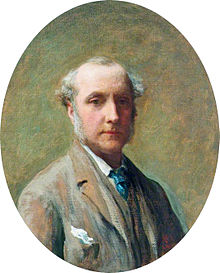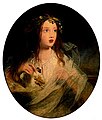James Sant

James Sant CVO RA (1820–1916) was a British painter specialising in portraits and known particularly for images of women and children[1] and artistic exploration of the symbolism of childhood.[2] He was a member of the Royal Academy.[3] George Sant and Sarah Sant were also artists and are believed to have been his brother and sister.[4]
Biography
[edit]Sant was born in Croydon, Surrey, England, on 23 April 1820. He was taught first by the watercolourist John Varley, then by Augustus Wall Callcott,[5] then from the age of twenty was taught by the Royal Academy Schools.
He lived to the age of 96 and exhibited at the Grosvenor Gallery as well as producing nearly three hundred canvases for exhibition at the Academy. The first of these, a portrait of his father William Sant,[6] was exhibited in 1840;[7] the last was exhibited in 1915. In 1851 he married Elizabeth (Eliza) Thomson, daughter of Dr R.M.M. Thomson, a surgeon and member of the Agri Horticultural Society of India.[8] His 1853 picture of the infant Samuel was his first popular success, and engravings of this and of Little Red Riding Hood and The Soul's Awakening sold in great numbers.
In 1861, his portraits of friends and relatives of Frances, Lady Waldegrave were exhibited by Ernest Gambart at his Gallery in Pall Mall. This enhanced his reputation and he was elected ARA, and later RA; in 1871 he was appointed Principal Painter in Ordinary (official portraitist) to Queen Victoria, having become known for his portraits of the royal children and in particular his 1870 portrait of Prince Leopold and Princess Beatrice.[9] He was the last artist to hold the title.
Sant is best known for his portraits, particularly of women and of children; he was "the emperor of children," in the words of the Athenaeum. Nevertheless, many of his pictures were landscapes and particularly gardens; he also painted seascapes, landscapes with animals, and other subjects including the Wish Tower,[10] a Martello Tower at Eastbourne. His later pictures are freer in style; some have been favourably compared with the work of the French Impressionists[11] and some have a visionary or mannerist quality; his landscapes could include figures with blank or distorted features or simple silhouettes such as the nun in Convent Walls (1910).[12] He continued painting into old age; All My Fancy! (1910), an Italian landscape with villa and hills, he painted in bed from memory.[13]
He became a Commander of the Royal Victorian Order (CVO) in 1914 and resigned from the RA in the same year to "make room for younger men." He died in Lancaster Gate, London, on 12 July 1916. His work can be found at the Tate Gallery and at the National Portrait Gallery.
His sister Sarah Sherwood Clarke was also an accomplished artist: but all that is presently known of her work is a collection of 48 different views of Scotland from 1854;[14] these were exhibited for the first time at the "Watercolours & Works on Paper Fair" in London in February 2010.[15] She married Frederick Clarke, Superintendent and later Secretary of the London and South Western Railway.
His brother George Sant RBA (Royal Society of British Artists)(1821–1877) was a landscape painter and the two brothers occasionally collaborated on paintings. Both James and George Sant were among the notable artist acquaintances of Charles Dodgson (Lewis Carroll); James Sant, his daughter Sarah Fanny[16] and son Jemmy were the subjects of photographic studies by Dodgson.[17]
At auction, Sant's work can achieve hundreds of pounds sterling or hundreds of thousands of pounds depending on size, quality and subject matter.[18] Allegorical subjects remain popular; Courage, Anxiety and Despair: Watching the Battle (circa 1850) achieved £61,250 in 2012[19] and Astronomy almost twice this in 2008.[20] His The Schoolmaster's Daughter (1871) and Miss Martineau's Garden (1873) are illustrated in Victorian Painters by Jeremy Maas;[21] The Seventh Earl of Cardigan Relating the Story of the Cavalry Charge of Balaclava...(1854) is illustrated in the same volume and in Victorian Painters by Christopher Wood.[22] Sant's work can be seen at Southside House, Wimbledon, and at the National Portrait Gallery.[23] Many of his works were reproduced as prints during his lifetime; his Courage has since been reproduced as a greetings-card and his Hilda Pennington-Mellor, aged three (1880) as a post-card.[24]
Gallery
[edit]-
Self Portrait, 1844
-
Portrait of his wife Elizabeth and daughter, 1852
-
A Thorn Amidst the Roses, 1887
-
Lady in Pearls, 1880
-
The Novice, 1856
-
Russell Sisters, 1858
-
The Duet
-
The Fairy Tale, 1845
-
Courage, Anxiety and Despair: Watching the Battle
-
Princess Helena and Princess Louise
Legacy and offices
[edit]Sources
[edit]- Biography with photo Archived 3 March 2016 at the Wayback Machine
- Obituary
- Acquaintance with Lewis Carroll
- James Sant's son photographed by Lewis Carroll Archived 1 October 2020 at the Wayback Machine
References
[edit]- ^ Jeremy Maas (1988). Victorian Painters. Barrie & Jenkins. p. 215. ISBN 0-7126-2051-6.
- ^ "James Sant, C.V.O., R.A. (1820–1916)". Retrieved 22 April 2017.
- ^ "James Sant (1820–1916), Painter". Retrieved 22 April 2017.
- ^ "James Sant". Retrieved 22 December 2015.
- ^ "The Library of Nineteenth Century Photography". Retrieved 24 September 2015.
- ^ "Sant, James (1820–1916), portrait and genre painter". Archived from the original on 22 December 2015. Retrieved 22 December 2015.
- ^ "Classical Portrait of a Man". Archived from the original on 23 December 2015. Retrieved 22 December 2015.
- ^ "James Sant; Eliza Sant (née Thomson)". Retrieved 22 April 2017.
- ^ Gere, C. (2010). Artistic Circles: Design & Decoration in the Aesthetic Movement. Harry N. Abrams. p. 42. ISBN 978-1-85177-602-3. Retrieved 1 May 2019.
James Sant, who in 1871 succeeded Sir George Hayter as Queen Victoria's Principal Painter-in-Ordinary, had a successful career as a portrait painter.
- ^ "Martello towers". Retrieved 22 April 2017.[permanent dead link]
- ^ Sir Charles Holmes. The National Gallery: France and England. G Bell & Sons Ltd. p. 240.
- ^ "Convent Walls". 28 September 2015. Retrieved 12 May 2017.
- ^ "All My Fancy". 28 September 2015. Retrieved 22 April 2017.
- ^ "Sarah Sherwood Clarke nee Sant". 12 September 2015. Retrieved 22 April 2017.
- ^ "Watercolours + Works on Paper". Retrieved 24 September 2015.[permanent dead link]
- ^ "James Sant (1820–1916), Painter". Retrieved 22 April 2017.
- ^ "Lewis Carroll". Retrieved 24 September 2015.
- ^ "Art auction result for James Sant". Retrieved 22 January 2018.
- ^ "Courage, Anxiety and Despair: Watching the Battle". Retrieved 22 January 2018.
- ^ "Art auction result for James Sant". Retrieved 22 January 2018.
- ^ Jeremy Maas (1988). Victorian Painters. Barrie & Jenkins. ISBN 0-7126-2051-6.
- ^ Christopher Wood (1999). Victorian Painters. Antiques Collectors' Club. ISBN 1-85149-172-4.
- ^ "James Sant (1820–1916), Painter". Retrieved 22 January 2018.
- ^ "Other postcards". Retrieved 22 January 2018.
External links
[edit]![]() Media related to James Sant at Wikimedia Commons
Media related to James Sant at Wikimedia Commons
- Works by or about James Sant at the Internet Archive
- 67 artworks by or after James Sant at the Art UK site
- 1820 births
- 1916 deaths
- 19th-century English painters
- English male painters
- 20th-century English painters
- English portrait painters
- Principal Painters in Ordinary
- Commanders of the Royal Victorian Order
- Royal Academicians
- Artists from London
- People from Croydon
- 20th-century English male artists
- 19th-century English male artists















